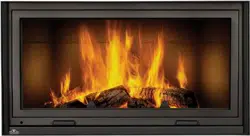Loading ...
Loading ...
Loading ...

W415-1676 / A / 03.17.17
33
EN
8.0 OPERATION
8.1 OPERATING SOUNDS AND SMELLS
31.4A
Expansion / contraction noises during heating up and cooling down cycles are normal and to be expected.
TIPS FOR BURNING:
• Create a large fire to heat up the appliance before closing bypass door and adjusting to a slower burn.
• To create a large, quick burning fire, use small pieces of wood.
• For a lower, but extended burn, stack larger pieces of wood close together.
• For long burns, leave a 1” (25.4mm) - 2” (50.8mm) bed of ashes.
• Burn dry wood only.
• With the exception of overnight burns, create large, quick burning fires whenever possible. Smaller, slow burning fires
using large logs will cause the glass to become dirty. Larger, quick burning fires using medium sized wood to refuel
frequently are much more efficient.
• It is important to minimize visible smoke emitting from the chimney. Burning seasoned firewood, maintaining the
appliance catalyst and following the operating instruction contained within this manual will ensure that visible smoke
emissions are minimized.
DO’S
• Verify with a moisture meter that wood contains no
more than 20% moisture content.
• Burn several pieces of medium sized wood as they
are better than a few big pieces.
• Clean chimney regularly.
• Refuel frequently using medium sized wood.
• “Fine Tune” the air settings (if applicable) for optimum
performance.
DONT’S
• Take ash out immediately. Let it accumulate to a
depth of at least one inch. A good ash layer provides
for a longer lasting and better burning fire.
• Burn wet wood with more than 20% moisture content.
• Close the door too soon or damper down too quickly.
• Burn one large log rather than two or three smaller,
sized logs.
•
Burn at continually “low setting” (if applicable), if glass
door is constantly blackened. This means the firebox
temperature is too low.
It is normal during operation to hear creaking and/or ticking sounds as the metal plate components of the
appliance expands and contracts. This may be present during both warm up and cool down periods.
During the break-in period (the first 2 or 3 fires) create only small, hot fires using kindling. This will allow
the firebrick to cure. Do not be alarmed if small hairline cracks develop in the firebrick. This is a normal
occurrence and does not pose a safety hazard. During this time the paint may also emit an odour as it cures
and you may wish to open a door or window to alleviate the smell.
There are many different ways to start a fire, review the hints and warnings in this section to ensure the fire is
started properly.
Loading ...
Loading ...
Loading ...
